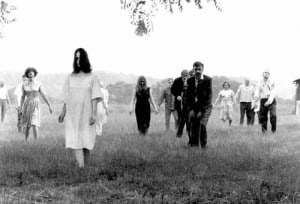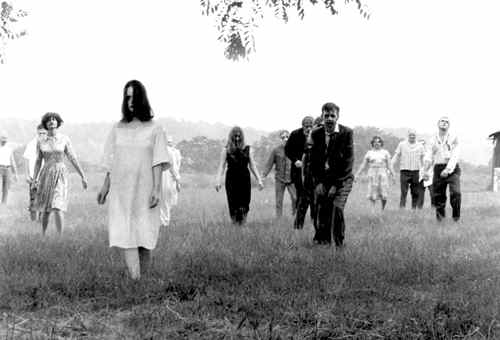
Zombies don’t attack each other, preferring their meat raw and wriggling.
AMC’s The Walking Dead is perhaps the best television on air today. Now, some of the high and toity might make the case for Downton Abbey, and admittedly my hometown’s penchant for bears, beets, and Battlestar Galactica might make one suspicious of my judgment, but hear me out.
The series begins after an infection has wiped out a significant portion of humankind, reanimating their corpses as rotting, mindless anthrovores. 1 The first season deals primarily with a small group’s struggle for survival against the ravenous hordes. Though well received, those first six episodes only provide a launching point for the story’s real…meat.
Season two begins to focus on various other dimensions of a post-zombapocalyptic world, ranging from the moral (Are these people just diseased and waiting for a cure, or should we be killing them all? Does the former exclude the latter?) – to the political. Spoiler alert: Democracy really isn’t the form of government best equipped to handle revenants. Step by agonizing lurch, the protagonists’ moorings come undone as they face crises that have little to do directly with the undead.
I have found Rick Grimes, the apparent leader of the group, particularly enthralling. Rick is your typical good guy sheriff. He assumes the mantle of responsibility for the group’s well-being, but this responsibility slowly tears him apart as it eventually pits itself against his family, his best friend, and his core convictions. The most recent two seasons in particular portray his slow, seemingly inevitable descent into inhumanity in excruciating detail. In the end, the series title really refers to characters like Rick more than to its zombie scenery.
And this, to me, speaks to what we real people can learn from a situation like a zombie apocalypse. Character formation is wrapped up with the choices we consistently make. But what sort of character is then possible for people when the only choices available are bad ones? (Aside: Not making a 2012 election quip right here is requiring real self-restraint.) As someone who likes to think himself largely responsible for his own moral state, this question disquiets me. What I find most horrifying about the show has little to do with flesh-eating corpses, but rather that it confronts me with the limitations of my freedom and, therefore, with the flimsiness of my moral self-righteousness.
— — — — —
- Excuse the neologism, but what do you call a former human who eats humans? When do you graduate from being a cannibal? ↩


